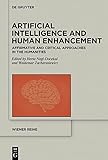Artificial Intelligence and Human Enhancement : Affirmative and Critical Approaches in the Humanities / ed. by Herta Nagl-Docekal, Waldemar Zacharasiewicz.
Material type: TextSeries: Wiener Reihe : Themen der Philosophie ; 21Publisher: Berlin ; Boston : De Gruyter, [2022]Copyright date: ©2022Description: 1 online resource (VII, 328 p.)Content type:
TextSeries: Wiener Reihe : Themen der Philosophie ; 21Publisher: Berlin ; Boston : De Gruyter, [2022]Copyright date: ©2022Description: 1 online resource (VII, 328 p.)Content type: - 9783110769913
- 9783110770292
- 9783110770216
- 174.90063 23/eng/20220510
- Q334.7 .N35 2022
- online - DeGruyter
- Issued also in print.
| Item type | Current library | Call number | URL | Status | Notes | Barcode | |
|---|---|---|---|---|---|---|---|
 eBook
eBook
|
Biblioteca "Angelicum" Pont. Univ. S.Tommaso d'Aquino Nuvola online | online - DeGruyter (Browse shelf(Opens below)) | Online access | Not for loan (Accesso limitato) | Accesso per gli utenti autorizzati / Access for authorized users | (dgr)9783110770216 |
Frontmatter -- Table of Contents -- Acknowledgements -- Introduction: Affirmative and Critical Approaches to Artificial Intelligence and Human Enhancement -- Part 1: Challenging “Strong AI” from the Perspective of Human Agency -- The Artificiality of the Human Mind: A Reflection on Natural and Artificial Intelligence -- Merits and Limits of AI: Philosophical Reflections on the Difference between Instrumental Rationality and Praxis-Related Hermeneutical Reason -- Experience, Identity and Moral Agency in the Age of Artificial Intelligence -- Outsourcing the Brain, Optimizing the Body: Retrotopian Projections of the Human Subject -- Life Care/Lebenssorge and the Fourth Industrial Revolution -- Part 2: Examining Merits and Limits of Applied AI -- AI’s Winograd Moment; or: How Should We Teach Machines Common Sense? Guidance from Cognitive Science -- Passing the Turing Test? AI Generated Poetry and Posthuman Creativity -- Why Neuroenhancement is a Philosophical Issue -- The Future of Artificial Intelligence in International Healthcare: An Index -- Part 3: Encounters with Artificial Beings in Film, Literature, and Theater -- Dark Ecology and Digital Images of Entropy: A Brief Survey of the History of Cinematic Morphing and the Computer Graphics of Artificial Intelligence -- Sentience, Artificial Intelligence, and Human Enhancement in US-American Fiction and Film: Thinking With and Without Consciousness -- “I, Robot”: Artificial Intelligence and Fears of the Posthuman -- AI on Stage: A Cross-Cultural Check-Up and the Case of Canada and John Mighton -- Artificial Intelligence from Science Fiction to Soul Machines: (Re‐)Configuring Empathy between Bodies, Knowledge, and Power -- List of contributors -- Index of Authors -- Index of Subjects
restricted access online access with authorization star
http://purl.org/coar/access_right/c_16ec
The technological innovations that have made "learning" computers possible are being met with utopian hopes as well as apocalyptic apprehensions. Will AI research eventually lead to software systems that have consciousness and are capable of autonomous decision making? The essays challenge "strong AI" from the perspective of human agency and moral judgment, explain the categorical difference between vulnerable humans and AI devices, and discuss diverse forms of applied AI, such as prograns of natural language processing, computional creativity, neuroenhancement, and the use of AI in international healthcare. These theoretical issues are illustrated in essays that focus on the encounter with artificial beings in film, literature and theater. Examining science fiction that blurs the borderline between humans and deep-learning androids, the essays explore, and challenge, ways of questioning human exceptionalism, for instance by visualizing non-conscious cognition and sentience. The book suggests a sober distinction between well-argued achievements of digital technology and excessive, unfounded expectations.
Issued also in print.
Mode of access: Internet via World Wide Web.
In English.
Description based on online resource; title from PDF title page (publisher's Web site, viewed 02. Mai 2023)


